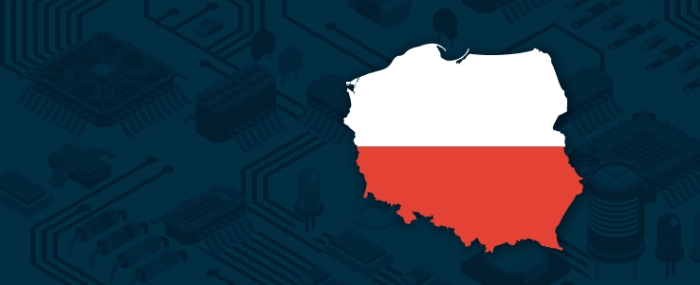
Poland in the race for the Baltic AI GigaFactory
Poland, together with Estonia, Lithuania and Latvia, has submitted an Expression of Interest to the European Commission for the creation of the Baltic AI GigaFactory – a project valued at around 3 billion euros and designed to become the region’s largest high-performance computing infrastructure for artificial intelligence. According to Poland’s Ministry of Digital Affairs, the proposal was formally lodged in June 2025 as part of the EU’s InvestAI initiative. Now these countries must wait for a decision.
At the heart of the project is the ambition to establish a world-class AI infrastructure network, with the main facilities expected in Poland thanks to its advanced energy and cooling systems as well as low-latency connectivity. The plan also foresees a distributed ecosystem linking AI centres across the region, including Warsaw, Kraków, Gdańsk, Wrocław, Poznań, Vilnius, Riga and Tallinn. Reports from Evertiq.pl and regional ministries describe the scale as unprecedented, with up to 100,000 state-of-the-art GPUs potentially being deployed to support AI models of over a trillion parameters.
The overall investment is estimated at billion euros, with around 65% expected to come from private investors and the remainder from European and national funds. Government documents emphasise that the entire infrastructure will be powered by renewable energy, and the siting of data-intensive facilities in Poland takes advantage of favourable climate conditions for cooling. This green foundation is presented as an integral part of the GigaFactory’s long-term competitiveness.
One of the strongest arguments in favour of Poland as a host country is precisely its climate. Average annual temperatures are significantly lower than in many other developed European data centre hubs. For Warsaw, the figure stands at 8.88 °C, compared with 12.89 °C in Madrid, 13.92 °C in Milan and 17.65 °C in Athens. Lower temperatures mean a reduced demand for energy used in cooling, which is a critical cost driver for such facilities. Analyses by the Polish Data Center Association (PLDCA) indicate that for an AI gigafactory with a power capacity of 100 MW, the annual energy consumption per unit of computing power would be noticeably lower in Poland than in most other European regions, apart from Scandinavia. Over the full lifecycle of the investment, this translates into substantial operational savings and improved cost efficiency.
For the governments involved, the initiative is not merely a technological milestone but a matter of strategic importance. As Lithuania’s Minister of Economy and Innovation Lukas Savickas stated in June:
“Every major investment in Poland, Lithuania, Latvia or Estonia is an investment in the security and economic strength of the entire Baltic region. We must act as a single region — fast, innovative and reliable.”
Poland’s Deputy Minister of Digital Affairs, Dariusz Standerski, highlighted Warsaw’s role in leading the effort:
“I am proud that Poland is building a coalition of countries and stakeholders committed to developing artificial intelligence. The Baltic AI GigaFactory will provide world-class computing infrastructure for researchers, entrepreneurs, industry and citizens across the region.”
In his words, the initiative represents both “a leap toward digital sovereignty and innovation at scale” and a practical integration of national AI hubs across the Baltic.
Beyond political backing, the consortium has also been actively encouraging companies and institutions to join. Lithuanian officials have stressed that businesses participating in the project will be able to contribute directly to infrastructure development and become part of Europe’s emerging AI ecosystem.
While the project remains at the Expression of Interest stage, momentum is clearly building. Coverage in PAP and Central European Times has pointed out that final EU engagement could be announced later in 2025, potentially marking a decisive step in Europe’s efforts to establish its own large-scale AI infrastructure.
For Poland and the Baltic States, the stakes are high: ensuring technological sovereignty, supporting local AI solutions such as regional language models, and attracting global investors to a green, future-proof infrastructure. If successful, the Baltic AI GigaFactory could position Central and Eastern Europe at the forefront of the continent’s digital transformation.



